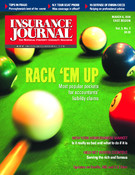Dozens of federally insured medical providers have been blocked from helping the Gulf Coast recover from Hurricane Katrina because their liability protection doesn’t apply outside their own states.
Doctors and nurses from community health centers across the country who encountered the insurance problem after Sept. 11, and found it most devastating after Katrina, hope a change can be made before another emergency.
Unlike the 2001 terrorist attacks, the hurricanes raised the medical liability issue by hitting health clinics as hard as the victims they had to treat. Fourteen Texas centers asked sister clinics to send doctors, nurses, equipment and medication. Dozens of other centers in the state were among those prevented by the law from helping.
“If we are hit by another natural disaster, we’ll have the same problems all over again,” said Jose Camacho, executive director of the Texas Association of Community Health Centers.
One physician who was thwarted was U.S. Rep. Joe Schwarz, R-Mich. “This is a little quirk in the tort laws, but it’s a big piece of a big puzzle,” said Schwarz, an ear, nose and throat doctor in Battle Creek, Mich. “We have all these centers with superbly trained individuals who do these things locally all the time, and to deny people access to their physicians if there’s a disaster is senseless.”
His proposal to allow federally insured medical employees to be covered for work in a declared disaster area drew attention from Rep. Paul Gillmor, R-Ohio. Gillmor co-sponsored the bill because a health center in his district, Fremont, Ohio, tried unsuccessfully to send medical volunteers to Biloxi, Miss., as recently as January.
Similarly, it took so long for a federal review of Iowa volunteers that they had to return from New Orleans after a week, said Michelle Stephan, chief executive at Siouxland Community Health Center in Sioux City. “They just sat around. They went and viewed the damage, but they were almost in the way of relief efforts,” said Stephan.
Private market
The Texas health centers tried buying private liability coverage for providers coming in from out of state. It didn’t work, Camacho said, because the insurance market wouldn’t support new coverage for the high-risk hurricane relief effort. A change in the law wouldn’t affect the private insurance market; the federal insurance is funded entirely by taxpayers. Congress gave $1.8 billion to the centers in 2006, and $45 million was set aside for the insurance.
Copyright 2006 Associated Press. All rights reserved. This material may not be published, broadcast, rewritten or redistributed.
Was this article valuable?
Here are more articles you may enjoy.


 The $3 Trillion AI Data Center Build-Out Becomes All-Consuming for Debt Markets
The $3 Trillion AI Data Center Build-Out Becomes All-Consuming for Debt Markets  After Falling 6% in 2025, Average Auto Insurance Cost Will Stabilize in 2026, Says Insurify
After Falling 6% in 2025, Average Auto Insurance Cost Will Stabilize in 2026, Says Insurify  Uber Jury Awards $8.5 Million Damages in Sexual Assault Case
Uber Jury Awards $8.5 Million Damages in Sexual Assault Case  Allstate CEO Wilson Takes on Affordability Issue During Earnings Call
Allstate CEO Wilson Takes on Affordability Issue During Earnings Call 


